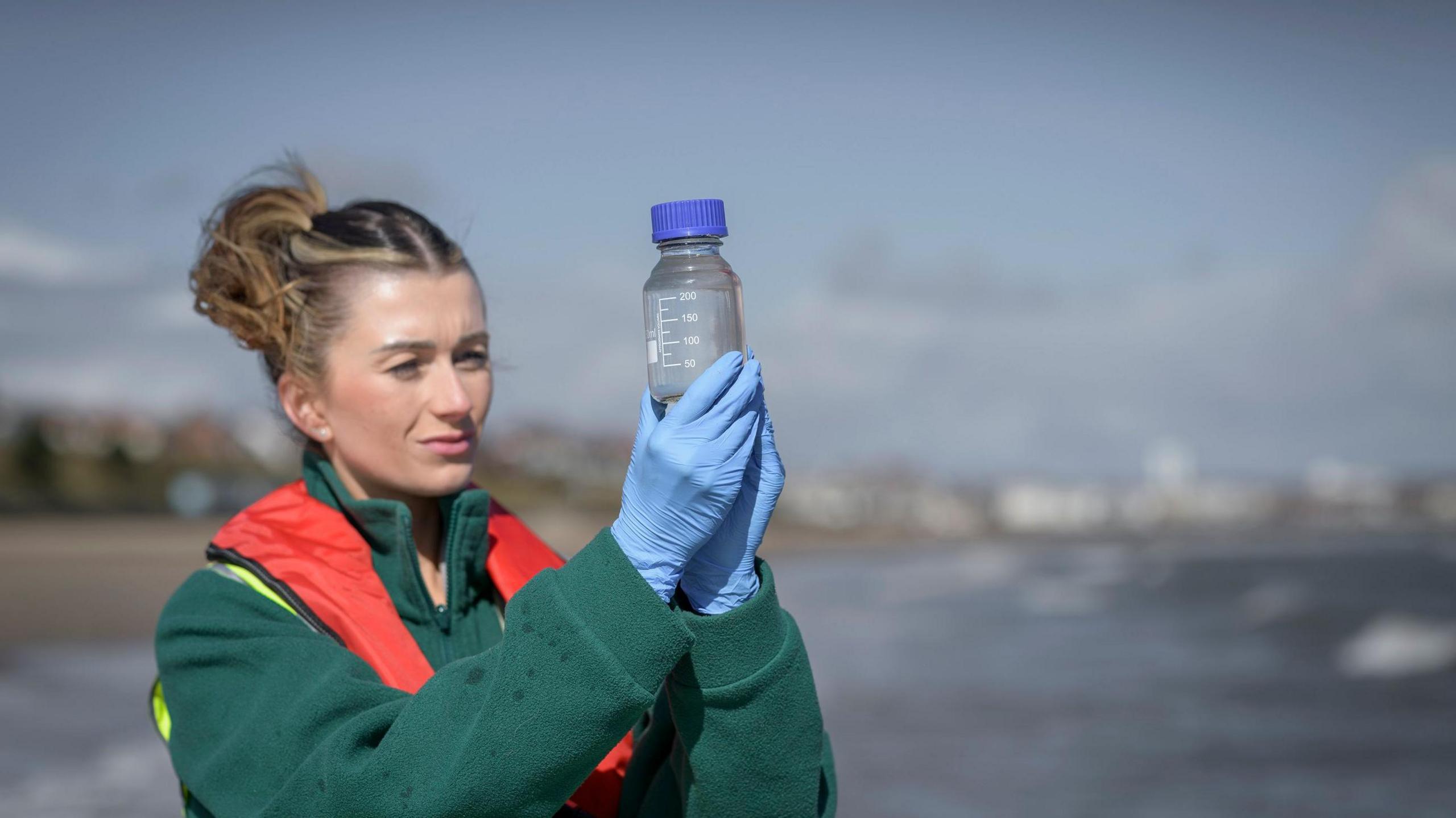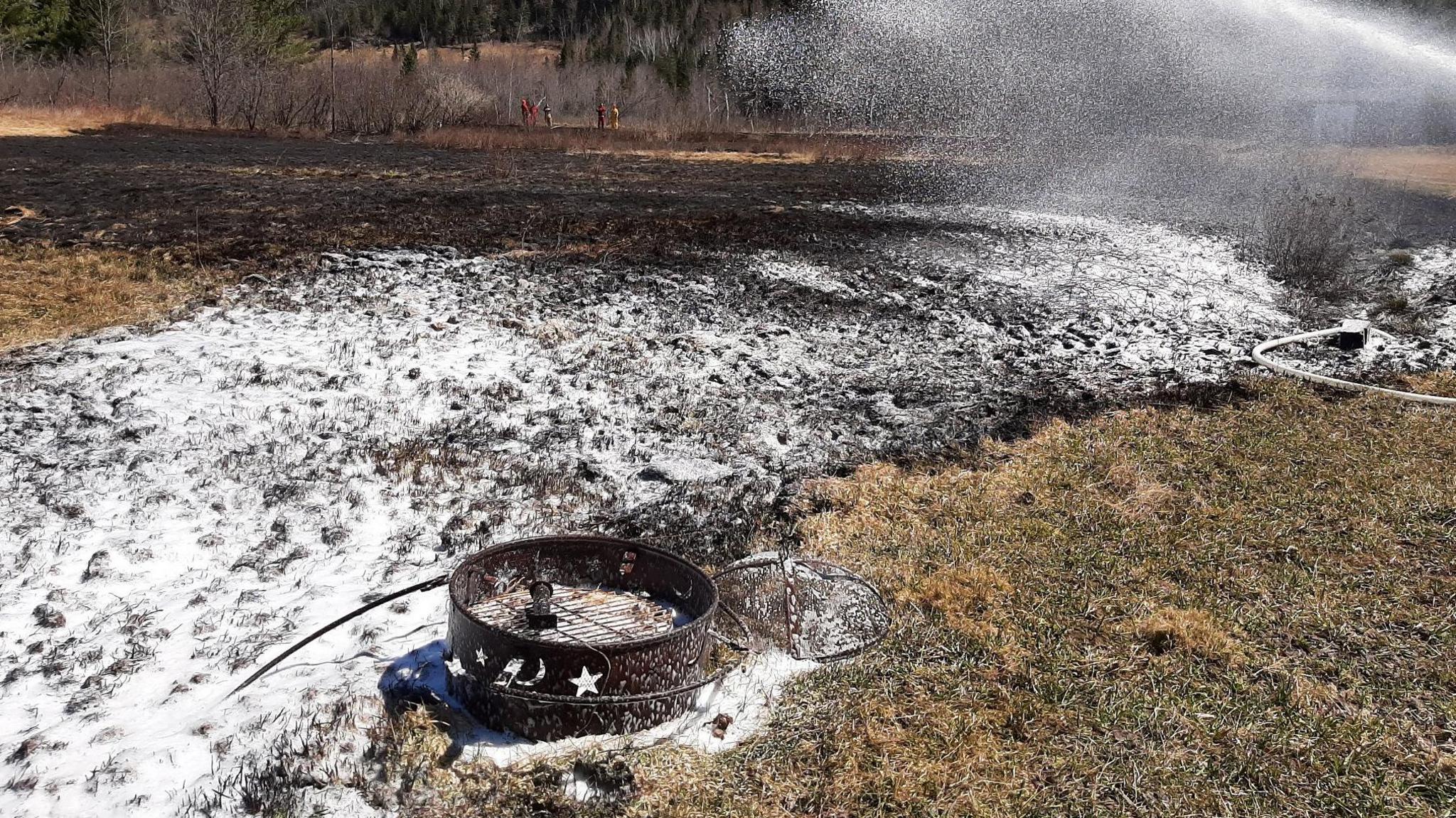Firms ordered to reduce forever chemicals in drinking water sources for 6 million people

- Published
Water companies have been ordered to tackle potentially harmful levels of so-called forever chemicals in drinking water sources for more than six million people, the BBC can reveal.
Forever chemicals, or PFAS, are a group of thousands of substances used in everyday products. They are persistent pollutants which build up in the environment, and a small number have been linked to increased risk of some serious illnesses.
The BBC examined 23 enforcement notices issued by the Drinking Water Inspectorate over elevated levels of PFAS which could "constitute a potential danger to human health" to see how many people were affected.
Industry body Water UK said it was confident drinking water was safe.
But Water UK called for a ban on the chemicals to prevent accumulation.
Amid growing worries about these chemicals, water companies have been required since 2021 to test for 47 of the most concerning ones in water supplied to customers' homes and drinking water sources such as aquifers and reservoirs.
In the last four years, 1.7 million tests for individual forever chemicals have been carried out across the network. At least 9,432 of those recorded PFAS levels above the level which the DWI says could constitute a potential danger to human health, external.
When a test result is above or likely to breach this level - set at 0.01ug/L - (micrograms per litre) the Drinking Water Inspectorate issues enforcement notices to the water company requiring action to be taken to ensure water is safe.
The BBC analysed the enforcement documents, highlighted by Watershed Investigations - a group of environmental journalists - to identify all the water supply areas with sanctions in place.
Using publicly available information, we matched each supply system to the number of customers it serves, identifying a minimum of six million people.
Forever chemicals have been used prolifically since the 1940s in thousands of products from frying pans to medical equipment to school uniforms.
Over time they have found their way into the environment - and the water that gets treated for drinking - through the washing of PFAS products, storm runoff and releases from industrial sites, according to Dr William Hartz, an environmental chemist specialising in PFAS at research institute NILU in Norway.
He said this might include PFAS leaching out as rainwater filters through landfill sites or firefighting training sites, where the use of some firefighting foam directly releases forever chemicals into the environment.
The study of PFAS is an emerging field but a small number of these chemicals have been identified as carrying significant risks to human health.
Earlier this year the World Health Organization raised significant concerns, external about two specific compounds. It classified, external PFOA as carcinogenic, and PFOS as possibly carcinogenic - increasing the risk of thyroid, testicular and kidney cancers, external. Both substances are now banned.
Toughen 'forever chemical' water rules - experts
- Published18 October 2023
'Forever chemicals' limited in US tap water
- Published10 April 2024
But Megan Kirton, senior projects officer at environmental charity Fidra, said the chemistry of PFAS meant they do not easily break down, so even if banned they remain in the environment unless treated by water companies.
"It's a very tough situation that we're in, because PFAS is very hard to get out of water. It's like trying to get milk out of your coffee once you've already poured it in there," she said.
The BBC assessed more than 2,000 individual test results from 2024, obtained via Freedom of Information Act requests, to identify which specific PFAS compounds were being found when levels breached the limits. This showed that both PFOS and PFOA were found in more than 350 of the drinking water tests.

Some firefighting foam used on chemical fires previously contained the now banned forever chemicals PFOA and PFOS
The Drinking Water Inspectorate has said that water quality remains safe because, once a sanction is issued, water companies are required to increase testing, change or strengthen treatment for PFAS, or remove a source of drinking water altogether.
This process can take several years and requires months of monitoring before a sanction is removed.
The inspectorate told the BBC that it "operates one of the world's most comprehensive PFAS monitoring programmes", ensuring the public can have "complete confidence in the safety of their drinking water".
However, environmental charities and the Royal Society of Chemistry have raised concerns that UK guidelines are not legally binding and that the limits, which are 2.5 times higher than those of the US, should be reduced.
"I think we have a pretty good idea of both what PFAS are in the waters in the UK, and knowing that these health effects happen at very low levels, so we think it's time that they put these guidance into law, to make sure water companies are fully held to account," said Stephanie Metzger, policy adviser at the Royal Society of Chemistry.
In July, an independent review, external into the England and Wales' water system commissioned by the government found that "there is a need for stricter treatment requirements to protect public health and the environment".
The BBC understands that the government is currently preparing a white paper in response to the review which will include changes to the Drinking Water Inspectorate.
But removing PFAS is very challenging for water companies with conventional water treatment infrastructure, the Environment Agency has said, external.
Prof Peter Jarvis, professor of water science and technology at Cranfield University, said there were technologies such as nanofiltration occasionally deployed by the water industry which could be used more widely, but that these came with high costs and huge energy demands.
"We have got to have a bit of a more mature conversation about how we go about implementing these types of technology, and how we pay for them," he said.
Water UK told the BBC that: "Regardless of where you are in the country, when you turn on your tap, you are enjoying the very best drinking water in the world".
But speaking to the Today programme, CEO David Henderson said that in light of the rising treatment costs the chemicals should be banned.
"This £70m we are spending each and every year should be paid for by the chemical companies, it is really unfair for people through their water bills to have this added on top," he said.
In addition to the comment from Water UK, a spokesperson from South West Water said that the five notices against it were "precautionary" and that it was "investing £42 million over the next five years to upgrade the water supply system."
Related internet links
Water companies told to refund £260m to customers for poor performance
- Published23 October

Sign up for our Future Earth newsletter to keep up with the latest climate and environment stories with the BBC's Justin Rowlatt. Outside the UK? Sign up to our international newsletter here.